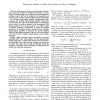19 search results - page 3 / 4 » Dynamic programming analysis of the TV game |
CDC
2010
IEEE
13 years 23 days ago
2010
IEEE
This research concerns a noncooperative dynamic game with large number of oscillators. The states are interpreted as the phase angles for a collection of non-homogeneous oscillator...
FPCA
1995
13 years 9 months ago
1995
Game semantics is an unusual denotational semantics in that it captures the intensional (or algorithmic) and dynamical aspects of the computation. This makes it an ideal semantica...
VALUETOOLS
2006
ACM
13 years 11 months ago
2006
ACM
Min-max functions are dynamic programming operators of zero-sum deterministic games with finite state and action spaces. The problem of computing the linear growth rate of the or...
NIPS
1996
13 years 7 months ago
1996
Although TD-Gammon is one of the major successes in machine learning, it has not led to similar impressive breakthroughs in temporal difference learning for other applications or ...
CEC
2010
IEEE
13 years 6 months ago
2010
IEEE
In modern racing games programming non-player characters with believable and sophisticated behaviors is getting increasingly challenging. Recently, several works in the literature ...

